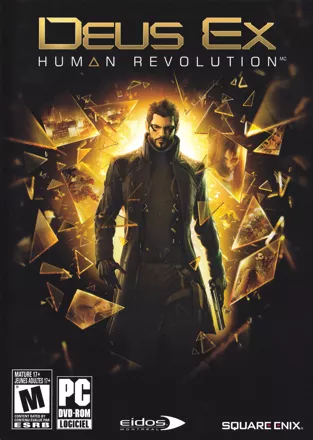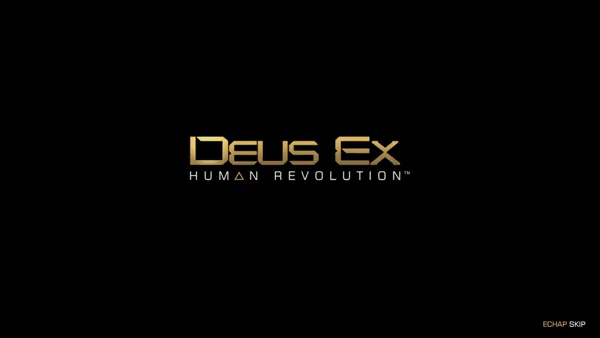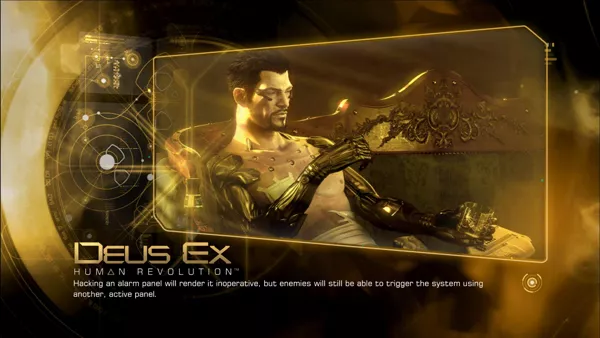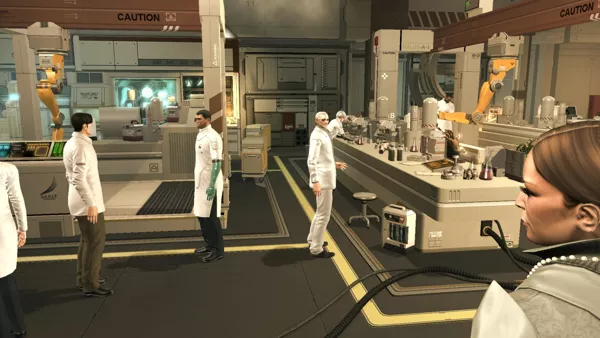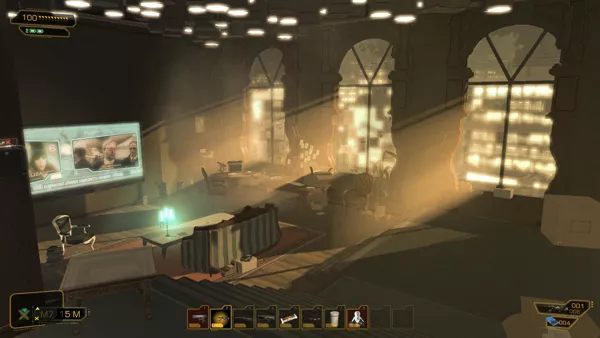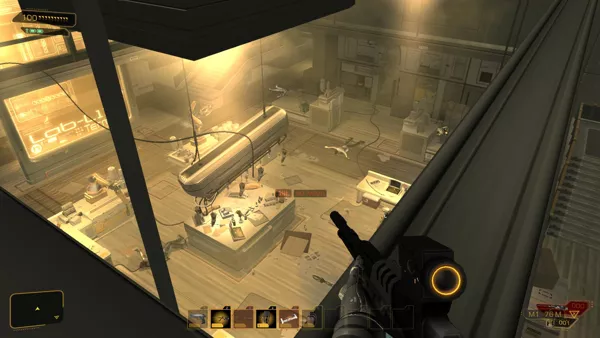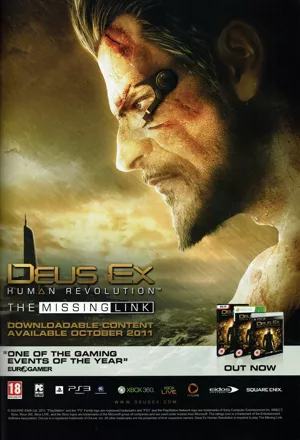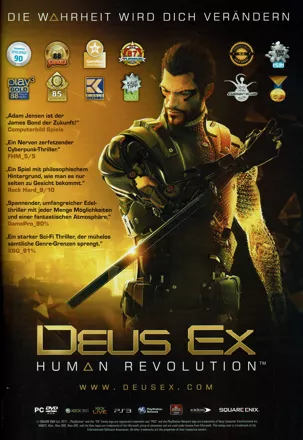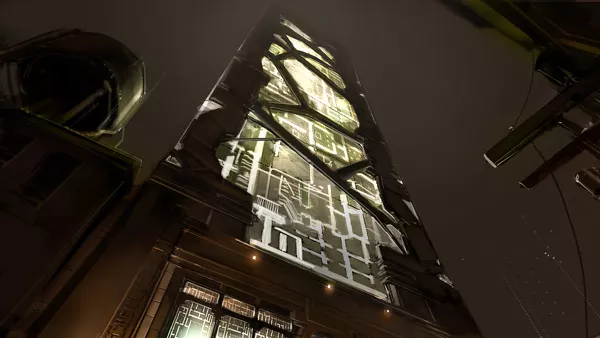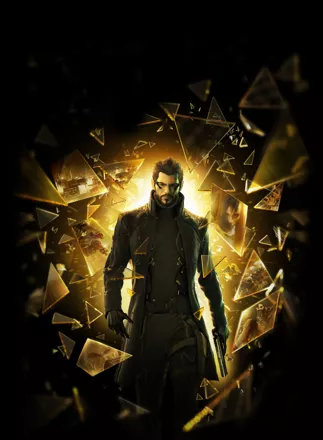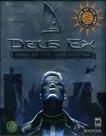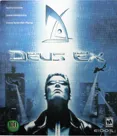Deus Ex: Human Revolution
Description official descriptions
In a near future dominated by chaos, conspiracies, and biomechanical augmentations, society is divided by various organizations fighting for supremacy, and large corporations extending their power beyond those of governments. An ideological war is growing between people who accept the biotechnological progress and people who fight it. A human revolution is coming.
Adam Jensen is a thirty-four-year-old ex-SWAT member from Detroit, enrolled by a powerful biotechnology company named Sarif Industries. His job is to ensure the scientists' private security and safeguard the secrets of the company's projects. The first day after his hiring, Adam Jensen is about to attend a meeting with David Sarif, the founder and CEO of Sarif Industries, when suddenly a red alert is issued in the company laboratories. A troop of mercenaries, apparently working for Belltower Associates, breaks in and kills several scientists. After having neutralized some of the mercenaries, Adam is severely injured by one of them. He has no choice but to be enhanced with biomechanical augmentations to save his life. His goal is now to discover what were the motivations of the attackers and unravel a greater conspiracy behind their actions.
Deus Ex: Human Revolution is the third game in the Deus Ex series. The events of the game take place in the year 2027, twenty-five years before those described in the first game. Like the first installment, the game is a hybrid of a 3D shooter with a stealth angle and role-playing. All styles of play can be adopted to succeed in the missions, from a totally furtive mode (some bonuses are granted in case the player character hasn't been detected during the whole mission) to the most brutal one. The player's decisions may have an impact on the storyline.
The game offers a vast array of weapons and biomechanical augmentations (hacking, social, stealth, sight, armor, combat skill enhancements, etc.). Various amounts of experience points are awarded for completing main or secondary quests, avoiding or eliminating enemies, hacking, reading electronic books, and discovering secret passages. After having accumulated a certain quantity of experience points, the player is awarded a "praxis kit", which can be manually used to learn or improve an augmentation. These kits can also be found during exploration or purchased in clinics.
Role-playing elements include, besides augmentations and general character-building, exploration of non-hostile areas and dialogue with non-playable characters. During certain crucial moments, the player will have to participate in a "conversation battle" with a key character, selecting the correct psychological approach and influencing subsequent plot events.
A few modifications have been made to the shooting gameplay, emphasizing its tactical aspect. The third-person cover system is integrated into otherwise fully first-person gameplay. Enemies often appear in groups led by a commander; taking out the latter may demoralize enemies, making them easier targets. Though the game still contains health-restoring items, the protagonist's health regenerates itself over time.
Spellings
- デウスエクス - Japanese spelling
Groups +
- 3D Engine: Crystal Engine
- Censored Japanese releases
- Covermount: Level (Romania)
- Deus Ex series
- Gameplay feature: Body dragging
- Gameplay feature: Character development - Skill distribution
- Gameplay feature: Grid Inventory
- Gameplay feature: Multiple endings
- Games made into books
- Games made into comics
- Games with 451
- Games with Dopefish
- Middleware: FaceFX
- Middleware: Scaleform GFx SDK
- PlayStation 3 Essentials Range releases
- Protagonist: Cyborg
- Setting: 2020s
- Setting: City - Detroit
- Setting: City - Singapore
- Software Pyramide releases
- Theme: Hacking / Pseudohacking
- Xbox 360 Classics releases
Screenshots
Promos
Videos
Add Trailer or Gameplay Video +1 point
See any errors or missing info for this game?
You can submit a correction, contribute trivia, add to a game group, add a related site or alternate title.
Credits (Windows version)
502 People (449 developers, 53 thanks) · View all
| Producer | |
| Game Director | |
| Art Director | |
| Audio Director | |
| Production Manager | |
| Animation Director | |
| Art Direction Presentation | |
| Lead Animator | |
| Technical Director Animation | |
| Animators | |
| Rigging/Skinning | |
| Additional Animation | |
| [ full credits ] | |
Reviews
Critics
Average score: 89% (based on 76 ratings)
Players
Average score: 4.1 out of 5 (based on 125 ratings with 6 reviews)
The Good
Okay so... Most people probably remember how I absolutely trashed the first Deus Ex game. I was intrigued by its premise but thought the RPG elements were poorly implemented and systematically ruined the game with its poor collision detection and laughable AI. Since Deus Ex: Invisible War was widely trashed by fans of the first game I decided to ignore it completely, but when Human Revolution came out I decided to pick it up to see if it had fixed the mistakes of the first game. After playing it, I can attest that Deus Ex: Human Revolution is everything the first game needed to be and more. This is by far one of the deepest games I've ever played (it's not like I play many deep games, but yeah) and definitely one of the most satisfying. It's an intriguing mixture of action and stealth with a compelling storyline to boot. It introduces some new concepts and definitely tries to "appeal" to the current crowd with stuff such as regenerating health and a cover system, but you'd be surprised on how well these mechanics work in the game.
Deus Ex: Human Revolution is set in the not-so-far future (2027 or something if I remember correctly) and the player takes control of Adam Jensen, the chief of security for the Sarif Industries, one of the leading industries in the field of Mechanical Augmentations. Basically in this new era and age it is possible to enhance or completely replace human body parts with mechanical ones, allowing many to become "superhumans" of sorts. Naturally this does have negative consequences as many people lose their jobs or are unable to afford augmentations, causing the rise of "humanity purists" groups who strongly oppose augmentations. Whatever though, you'll get to see the rest of the social-political talk once you play the game. Anyway, one fateful day Sarif Industries is attacked by an unknown group of mercenaries who attack the offices of the lead scientist Megan Reed (Adam's love interest) and her team, killing many scientists and Adam Jensen himself in the process. He didn't suffer brain damage however, and thanks to the advanced augmentation technology Adam's body is restored to life. Now augmented against his own will, his body reacts better than usual to the augmentations and he's tasked with finding the ones responsible with the attack, traveling across the globe and uncovering a huge conspiracy in the process. The storyline is interesting and well done. There is a lot of text to page through but this is usually well written and genuinely contains some interesting questions and fears for the future.
The game itself can either be played as a First Person Shooter or a Stealth game. Adam will have access to a variety of weapons for many purposes, from tazers to machineguns, from laser rifles to pulse cannons. These can either kill or knock out an enemy. Generally the game rewards you more for being non-lethal but let's face it, when facing some of the evil mercenaries it's more satisfying to kill them outright (and by that time you don't need as much experience as at the start anyway). There are some interesting gunfights in the game, for example the warehouse ambush in Hengsha or the Alice Garden assault.
As with the first game there is a lot of hacking involved, as you'll have to unlock terminals and computers to reveal hidden items or important information. One thing I didn't like is that some of the computers you hack contain absolutely no relevant or interesting information whatsoever (a few contain comic relief at least), so what's the point besides getting more experience? Hacking gets harder as the game progresses but for that reason there's upgrades related to it.
The fishy melee aspects of Deus Ex 1 have been replaced with a new Takedown feature which works very well. When close to an enemy, pressing the B button will show a cinematic where Jensen knocks out or kills an enemy in numerous ways, effectively making melee based entirely on cinematic. These are fairly entertaining to watch however and are monumentally better than the useless weapons in the first game, and they can either be lethal or non-lethal.
RPG elements come in the form of enhancing or purchasing augmentations that allow Jensen to gain new abilities, like being able to take down two people at once, improve his resistance to enemy fire, being able to turn invisible for a few seconds, and many other cool stuff. I'm usually not a fan of RPG elements as they tend to unnecessarily slow down a game for seemingly no good reason, but I have to say these were done rather well. Purchasing is done through Praxis kits: these can either be purchased or acquired with 5000 experience points every time (and sometimes found in secret areas). I'm also glad they took out the horrible detailed locational damage which was just a chore and not fun at all.
By far the most satisfying aspect of Deus Ex: Human Revolution is that enemies actually die (or fall asleep) when you shoot them! In the first game, the aiming was so awful that even after waiting 30 seconds for the crosshair to adjust its position it was still almost impossible to get a decent shot at anyone, but here aiming is absolutely dead-on, and even without the (obligatory) upgrades for it it's still somewhat respectable.
Most people despise the bosses because they "feel out of place", but these people don't seem to realize that Deus Ex Human Revolution is ALSO a shooter and the bosses empathize the shooter elements of the game. To be honest, the first one can be defeated in 5 seconds with the sniper rifle and the final boss makes absolutely no sense whatsoever (I have no idea how I defeated it but I did so without even taking damage). However, the second and third bosses were exceptionally fun and there is more than one strategy in taking them out. And yes, shooting them repeatedly is FUN.
The game gives you some main missions and various side missions, and there are various ways to finish and approach each one. There are many choices that can be made, both story-wise and gameplay-wise. To be honest, none of these choices have any relevance to the ending whatsoever, so perhaps some will wonder what the point is, but it's a nice touch nonetheless.
The controls in general are very good, as mentioned there is a cover feature which works very well (and in which the game wisely switches to a third-person mode), and in general it's easy to navigate the surrounding areas without getting spotted by enemies (watch out for the cameras and robots though!).
The graphics are mostly good, although they are a bit too dark at times (well, the game takes place at night almost all the time) and there is a yellow "glow" to everything (this can be disabled on the PC version from what I know, making the game significantly better looking).
The sound department is alright, all weapons sound as good as they should and the voice acting (well, at least in the italian version) is respectable. During gunfights appropriately "dramatic" music plays and during stealth sequence eerie ambient music is played.
You know, I just kind of hate when games often focus on complex story-telling and "deep" RPG elements and completely ignore important issues like bad collision detection or simply unengaging gameplay. When the focus switches to style over substance. Why can't we have both? Deus Ex Human Revolution succeeds mostly because it is able to have a good story and provide a reasonably deep gaming experience, but at the same time the gameplay aspects of the game are satisfying enough. There are other games that manage to provide both depth and fun, but I think that in this year and age it is time to realize that videogames are, in the first place, videogames, and not virtual books. That is the lesson Deus Ex Human Revolution teaches, and I hope it's something that other developers will see as a reference as time goes on.
The Bad
Well there are quite a few things I didn't like about this. For one thing, what I certainly didn't like were the atrociously SLOW load times. I honestly am not sure if I spent more time playing the game or watching the load times. I suppose considering you can pretty much save anywhere (unlike most modern games) that is to be expected, but that doesn't mean I didn't find it to be annoying. We're talking about 20-40 seconds load times here.
The inventory space could have also been slightly enhanced, I know it's possible to do that with augmentations but I often had to drop items I could have needed to get new weapons and that was just annoying. Oh well.
The game definitely has a slow start and I believe a few more of the augmentations should have been enabled from the start (for example at least the first Armor upgrade, Jensen is so fragile that he can be killed by ONE gunshot without upgrades.)
Another minor issue I have is that sometimes in Hengsha and Detroit there is a lot of traveling to be done just to talk to someone and it gets boring very quickly, unless you purchase the running upgrades early on.
The Bottom Line
Despite its flaws however, the more I played the game, the more I liked it .Overall I would have to say that it really is a well crafted adventure that manages to stay true to the original's formula while making it more "accessible" and, most importantly, removing the pitiful collision detection and AI of the first game, managing to be the mixture between FPS, Stealth and deep story-telling that the original could not fully achieve. It is a very deep experience that any experienced gamer is sure to enjoy from start to end. Not just the gameplay, but even the theme of it is enjoyable and aspects such as the social battles really should be used by more games. Deus Ex: Human Revolution may probably frustrate casual gamers, but anyone willing to put some time into it will surely be rewarded. Definitely one of the best games of recent times. In fact, this is so good that it makes me want to completely reconsider my opinion on the first game. Whichever the case, after hearing a lot of praise regarding Deus Ex's deep, for the first time I can finally say "Yeah, I get it.".
Xbox 360 · by CKeen The Great (160) · 2012
The Good
It is sad to see that Eidos jumped on the bandwagon with their flagship RPG series, and went the Bioware route. Meaning that first they kickstart an awesome, intricate, deep RPG franchise, then they proceed to ruin it to oblivion in its sequel(s) which end up being glorified First Person Shooters with mild RPG touches and very non-RPG-ish boss fights. FPS's are easier to develop and easier to market to the teen crowd, so I see the incentive. But really, what's next? Deus Ex 4: The iPhone Arcade Game? Anyway, there's still plenty to like here, so let's see:
This game is strong on atmosphere; sometimes that translates to oppressive, foreboding urban landscapes (Detroit), sometimes to exotic locales that ooze Oriental mystery and intrigue (China). Even the sterile office building interiors in this game are verisimilar and atmospheric.
Another strong point is imagination and immersion: the game dreams up a believable, fairly dystopian 2027 where we witness a widening gap between those who can afford flashy high-tech augmentations and those who cannot. The game takes its elaborate political-scientific-economic setup for granted and builds it from there, remaining very consequential and serious throughout in its depiction. No lazy shortcuts, no deal-breaking wink-wink-nudge-nudge allusions to the present day as a lesser sci-fi game would resort to. DE:HR is a mature attempt at imagining a possible, persistent 2027. In this regard, it is up there with Blade Runner's 2019 and Mass Effect's 2183.
As a consequence of the above, all the dialogs and the characters are very good, almost too good for an action RPG. Sarif is my favorite example: a charismatic, enigmatic leader and a love-hate father figure to our hero, he always has another revelation or two up his sleeve. The conversations in general are multi-layered, eloquent, emotionally mature and unpredictable. They should be good, as they are written by novelist James Swallow and veteran lead writer Mary DeMarle.
On a more technical note, this game has the best cover system I've experienced in an FPS/3PS yet. It's practical, very useful and easy to master. It's even great to look at: whenever Adam leans next to a wall in his aug-sunglasses, silenced gun in hand, and an enemy guard approaches from around the corner (as it occurs dozens of times in the game), it looks just like a shot from some cool sci-fi comics. As far as cover systems go, I hope future action games look at DE:HR and take it from there.
The Bad
This is an FPS. Granted, this is an FPS that can be optionally played as a survival stealth game. Yet it was marketed as an RPG. If it walks like a duck and quacks... you know the rest.
The game actually becomes unapologetic in its FPS-ness by the second half. The focus shifts to sneaking, evading turrets and upgrading your weaponry so you finally have a chance against Jamar and Zhao, the last two bosses.
Oh yes, don't get me started on the boss fights. These are the equivalent of Eidos's ultimate testimony that they WERE thinking on FPS terms with this game.
Then there is the problem of repetitiveness in the second half, again a typical FPS trait.
The Montreal stage is a seemingly endless array of boring office rooms and vent ducts.
Much of the Singapore stage is, surprise, a seemingly endless array of boring office rooms and vent ducts.
The following Panchaea stage, however, is quite brilliant, as if the project leader finally burst out: "Guys, we need to end this one with a bang! No more office rooms and vent ducts, use your head! This is s'posed to be a Deus Ex game!"
It ended up as an odd out-of-place homage to Half Life 1 (and even to Left4Dead), but I loved it.
The Bottom Line
When taken at face value and not as the latest entry of a venerable RPG franchise, DE:HR proves to be a very playable FPS with some RPG elements, in fact it stands out as probably the best of its kind this year. It's much longer and more interesting than other 2011 FPS/3PS titles I've played. Problems arise when we realize that it's supposed to be a full-blooded prequel to Deus Ex. THE Deus Ex. The fact is, Eidos went the safest, trendiest route here and tried to appease both contemporary fan camps: the newer generation of hardcore action afficionados (who were reared on Quake 3 and Half Life 2) and the older generation of actual Deus Ex fans. As Mass Effect 2 and Dragon Age 2 have proved just before DE:HR, you can't have the best of both worlds in RPG gaming: you either go "deep, hardcore RPG" or you're lite and flawed. Deus Ex has just joined the club of flawed game franchises.
And yet Deus Ex: Human Revolution excels in one aspect: give me its memorable vision of a 2027 Shanghai any day.
Windows · by András Gregorik (59) · 2011
The Good
What I liked most about Human Revolution is how the developers exercised a good deal of moderation in dumbing it down. For example, they introduced regenerating health, which is normally considered a dumb feature, but they also made the weapon damage high and the regeneration slow, thus negating some of the dumbness. They removed skills, but deepened augmentations. And so on... Overall it's nowhere near the disaster Oblivion or BioShock were.
In some ways, it's better than the first Deus Ex. The dialogues are deeper, and there seem to be more choices and consequences (I only finished it once), the graphics are of course a lot more detailed, and the engine renders the atmospheric environments well. I liked it a lot better than the shiny Unreal3 look from other contemporary games. Performance is fine too (at least on DX9.)
Aesthetically, it's quite pleasing. The Detroit area is the weakest. The other hub has some beautiful environments, and the missions have their striking moments too (except a certain dock mission, which is both visually boring and poorly motivated).
The side quests are interesting. Most of them somehow tie into the augmentation debate - the brainwashed mercenary-assassin who starts killing his employers, the prostitutes who are forced into augmentations to enhance their clients' pleasure (yikes), etc. They are comparable or better than anything the original had to offer.
The Bad
What bothered me the most was that they changed the gray, realistic visuals from Deus Ex into something that reminds me more of cyberpunk anime, which makes it lose some of its impact. For example when a character talks about private security forces as 'capitalism's final encroachment into one of the most lucrative industries' it's actually quite a deep thought that's relevant to our modern world, but because it's said by a cartoonish character in a cartoonish world, it will hardly register.
Then there are the three unavoidable boss fights that happen in small rooms and can only be defeated by shooting them long enough (and it does take a long time). I don't know why they put these in. Deus Ex is about being sneaky and clever. It's not about shooting a tank-like character in the face fifty times while dodging infinite bullets and grenades. It's almost like fighting bosses in a platformer.
Then there's the small stuff, like the third person cover and take-down mechanics, the much more game-y interface, the use of a quest compass (which is useful, but only because the map is so useless), lack of detailed locational damage, skills, lockpicks, etc.
The main storyline events are really dumb. For example, at one point, you have to figure out a freighter's destination. Well, we're the head of security of a mega-corporation in a cyberpunk setting, so how will we approach this? Will we attach a tracking chip to the ship? Will we watch it from orbit? From a plane? No? A boat then? How about hacking a computer for the schedule, or interrogating a dock worker with our arm blades? Nope, hobo Jensen decides he's going to hide in a cargo container to see where it's going.
The Bottom Line
It's... okay. It's better than Deus Ex in some ways and worse then Deus Ex in some ways. In most ways it's the same - and that's the problem. It's been ten years since DX1 came out, and one expects a certain amount of progress and increase in depth which Human Revolution hasn't delivered. It could've been more open, the world could've been more reactive, it could've partly simulated an economy and ecology, whatever. It could've been different, but instead it is too much of the same.
Windows · by dorian grey (243) · 2011
Discussion
| Subject | By | Date |
|---|---|---|
| Slipcase | Fred VT (25953) | Feb 18, 2014 |
| Habemus Missingm Linkem! | Slug Camargo (583) | Oct 18, 2011 |
| Guess what was outsourced? | Patrick Bregger (301024) | Oct 9, 2011 |
| First impressions | Unicorn Lynx (181775) | Sep 18, 2011 |
Trivia
1001 Video Games
Deus Ex: Human Revolution appears in the book 1001 Video Games You Must Play Before You Die by General Editor Tony Mott.
References to other games
In Frank Pritchard's office in Sarif Industries there is a poster on the wall with some character art and a title: Final Fantasy XXVII. Considering the fact that the events of Deus Ex: Human Revolution take place in 2027, this prognosis for a future installment in the Final Fantasy series (published by the same company) means that during the 16 years between 2011 and 2027 there will be 13 new Final Fantasy games released.
References to real life
During the arrival cutscene in Montreal, you see Picus Headquarters. The building for Picus Headquarters is modeled after the real-life Olympic Stadium in Montreal. In addition, at a certain point during the level, you overhear a couple of guards talking about the history of the building. They mention how during a concert, a concrete slab fell and crushed concertgoers. While thankfully that never happened in real life, it's a reference to various incidents involving pieces of the concrete structure in Olympic Stadium coming loose and falling off.
References to the game
Deus Ex: Human Revolution was parodied in an episode of "Die Redaktion" (The Editorial Team), a monthly comedy video produced by the German gaming magazine GameStar. It was published on the DVD of issue 10/2011.
Region lock
In August 2011, it was announced that the UK and Russian versions would be region locked. This stirred quite the controversy and after protests the region lock for UK was removed.
Awards
- GamePro (Germany)
- 2011 - #2 Console Action Game of the Year (Readers' Vote)
- PC Games (Germany)
- Issue 01/2012 - #2 Best Game in 2011 (Editors' Choice)
- Issue 01/2012 - #3 Best RPG in 2011 (Readers' Choice)
- Issue 01/2012 - #5 Surprise in 2011 (Readers' Choice)
Analytics
Upgrade to MobyPro to view research rankings!
Related Sites +
-
Deus Ex: Human Revolution
Official website (Multilingual) -
Deus Ex: Human Revolution at eidos.com
Game page on publisher's website (Multilingual) -
IGCD Internet Game Cars Database
Game page on IGCD, a database that tries to archive vehicles found in video games. -
Sarif Industries
Fictive website of Sarif Industries, the protagonist's employee (Multilingual) -
Wikipedia: Deus Ex: Human Revolution
The game profile at Wikipedia (English)
Identifiers +
Contribute
Are you familiar with this game? Help document and preserve this entry in video game history! If your contribution is approved, you will earn points and be credited as a contributor.
Contributors to this Entry
Game added by Tao_.
OnLive added by firefang9212. PlayStation Now added by Sciere. Xbox One added by MAT.
Additional contributors: Unicorn Lynx, JRK, CaptainCanuck, Fred VT, Patrick Bregger, Victor Vance, joicrawu.
Game added August 26, 2011. Last modified April 19, 2024.
